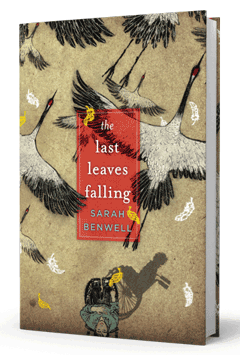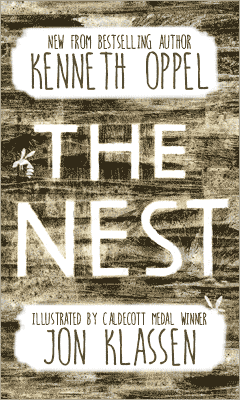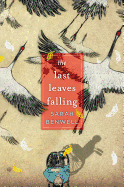 |
| photo: Jess Howley-Wells |
Sarah Benwell lives in Bath, England, where she teaches creative writing to teens. The Last Leaves Falling is her first novel, and it explores difficult questions about being ill and dying young with a mindfulness that makes the book both uplifting and deeply thought-provoking. Here she discusses its themes, its roots and its message of hope--which teens can share at TheWishTree.net.
This is your first novel. Have you always written?
Yes. My dad and I used to make up stories and play word games together, and listen to dramatic readings in other languages just to hear the way the words moved. So I guess that story and wordplay were always a part of my life. I've written for myself, and for others, written fun things and sad things and things which still haunt me. I've given stories as gifts and used them as weapons when it was all I had to wield. I've played hooky to write them on school days and run critique groups during homework hours. I don't advise shrugging off exams in favor of writing, but, um, my subconscious was pretty clear about the skills I should have been honing, and it didn't involve memorizing physics formulas. Thankfully, I also went out and saw something of the world; I don't think I'd be half the writer I am without those experiences.
You work with teens on their writing. Has the teaching of writing informed your own writing?
I think everything we do informs us, in some way. Every interaction changes us in tiny ways we may not even realize. Teaching creative writing has made me think in a deeper, more critical way about the way we craft narrative, about everything that goes into our work. It's allowed me to approach writing in new and interesting ways, in order to draw things out of my students without prescribing what they should create. It's given me a greater respect for the entire writer's journey--one that starts way, way before a book hits the shelves.
It also lets me regularly interact with young people, to exchange ideas with them, and get to know what they (some of them) think, what they care about, how they express themselves. And while I don't directly use that in my work, I'd hope it informs the way I portray young characters, as complex, intelligent individuals who have a lot to say.
What were the seeds of this project?
It started out as a very different story--one that explored suicide pacts in Japan and the culture that surrounds them. It stemmed from a conversation with a friend about Japan's horrific suicide statistics, and began as the story of three teens, Mai, Kaito and Sora, who formed a suicide pact and pledged to spend three perfect final days together before they went through with it.
But I got 13,000 words in and couldn't write any more. None of the characters would do anything I'd plotted out, and it just wasn't working. So I stopped, and thought about why, and it became a very different story: one of love and dignity and tough choices, of hope, and the way we live our lives.
It also explores assisted suicide, and I planted that seed with some trepidation. The moral and legal debates surrounding end-of-life choices and the right to die are--correctly--impassioned. It's a complex matter, and for many of us who've seen someone fight or languish, or wondered 'what if this were me?' it's a personal one. Whether we're for or against it or somewhere in between, debating is good. Exploring our thoughts and feelings is important.
Last Leaves offers one perspective--the voice of one, lone, fictional teenager--but I hope that it's done in such a way that readers can approach the issues and explore them safely, and make up their own minds.
Your portrayal of Japan is so intimate--the food, the park in Kyoto that Sora loves, the smells. Have you been to that country?
Japan is right at the top of my list of places to go, but I've not been fortunate enough to get there yet. I had a Japanese housemate for a while, and a friendship group of several international students, many of whom were also Japanese. We'd cook together, share our favorite books and music and TV shows, and we'd talk. A lot. We talked about the similarities and differences between Japanese and British life, culture, everything. So by the time the idea for the book appeared, I already had a grasp of the culture, as perceived by young people.
When it came to researching for the book, I read translated literature, watched Japanese soaps and anime, I spent hours on TrekEarth and reading the news, academic studies... everything I could get my hands on. I tried to teach myself Japanese, and didn't get far, but learned enough--along with reading literature--to understand the language patterns. And then I had more conversations and asked more questions.
I guess that through all of that, my writer brain noticed details and cultural conventions and stored them away for later use.
Finally, I had Japanese readers beta my work to check for mistakes and faux pas.
Your writing is so spare, it reads like haiku--especially because Sora's moments of clarity often occur in natural surroundings. And the poems by the samurai that Sora's doctor gives him sometimes have fewer than 10 words, yet they get to the truths of life. Tell us about that connection--how did you achieve that in your writing?
I love Japanese poetry. I love the philosophy and tradition of it. I love the meaning and depth you can fit into so few words. And the way it takes a tiny moment, but leaves this... space around it, which sort of ripples out and makes it feel like so much more.
Samurai death poetry in particular is fascinating. Within that artistic landscape it's also the last words these people put out into the world, right? And I love how much variation there is. Some of them are philosophical and pensive and beautiful. Some talk proudly about a life well lived. And then there are others that poke fun at their enemies or promise revenge. I love that we get to see circumstance and personality reaching out at us from the page from so long ago, and even within the rules of the poetic form.
I spent a lot of time immersed in Japanese art and culture, and I wanted to get across that sense of sparseness and the cultural values.
There's an embedded aesthetic in Japan, wabi sabi, which centers around transience and imperfection, and the beauty within that. It's something that was in my mind as I wrote. Life is transient and flawed, and I think that accepting that makes us look at things in a very different way.
The scene in which Sora believes he's driven his mother away and she returns with the story that explains why she always thought he'd be a teacher is so beautiful. The way you show that he has been living his vocation all along is so life-affirming. Did you plan to include that scene all along or did that evolve as you wrote?
I think it fits him. He's so obviously that person. And of course his mother, who is quiet and reserved and slightly in the background but always there, notices. I'm glad that they have all these moments, even amongst all the strain. I think that's important. But pretty much none of the book was consciously planned. I'd have thoughts and ideas and phrases that I liked and wanted to use, and a rough idea of the story arc, but I'm not a planner by nature.
One of the nice things about that--and about working with characters that feel so real--is that it can surprise you as you write. It's like watching a friend's story unfold as you walk through it beside them.
The scenes showing the obligatory visit from Sora's classmates and the visit(s) by Kaito and Mai stand in high contrast. Did you want readers to think about their own response to perceived disablility in others and how they might react?
I would definitely hope that Last Leaves allows readers the chance to examine their beliefs, yes. But I'd like them to make up their own minds. This isn't meant to be a sermon.
I don't think you can thoroughly or responsibly explore assisted death, or illness, disability or mortality, without exploring what living those lives is like. That includes the physicality of illness, the mental and emotional effects, and the outcome, but nobody lives in an isolated bubble, so it also necessarily includes societal perceptions and the reactions of those around us.
It's a complex, difficult set of subjects to broach, and no two people will have exactly the same thoughts or beliefs or reasons. His friends are very different, and they have to process in their own way, just as you or I would.
It was also important to me that his friends reach their own conclusions, just as it was important that you see Sora as a competent, rational young man who knows his own mind. Not just because of this story's outcome, but because Sora, just like any disabled person, is exactly that: he's a person, not a list of symptoms.
We loved the relationship with the grandparents, and how Sora teaches his grandfather how to master the computer.
Oh my goodness, the first of those scenes, where his grandfather writes to say that they've got a computer, and with their relationship and Sora's deterioration as subtext, was so hard to write. I wept buckets. I actually had to step away from the computer for a while.
I don't think we see enough rounded, positive portrayals of extended family in YA. Grandparents in particular often have unique, wonderful relationships with young people, and it's a shame that we don't celebrate that more.
In addition, elders are valued societally, as is ancestry and a sense of history, and they're important to Sora in his quest to mark out his place in the world. But they're more than that, they're vibrant, caring people who adore their grandson. They are ties to his past and his present, in equal parts, and it breaks my heart that they don't get a future together.
What changed between the British version of the novel and the U.S. version? Why?
The American and British markets work differently, and what's deemed as acceptable for younger readers is often different too. It goes both ways. There are things you'll find on each country's shelves but not the other.
There's a significant plot thread--a remnant of the original story idea--which doesn't make the U.S. text. As a result, the U.K. version juxtaposes end-of-life choices and suicide cults. The U.S. text focuses on Sora's journey.
It was a strange process to rework the text for the U.S. market, but at the end of it, I love them both equally. It's like they're identical twin books who, as they grew up, developed different interests and went their slightly separate ways.








